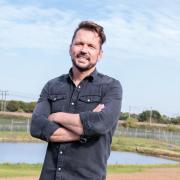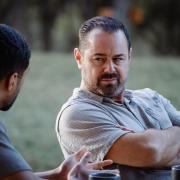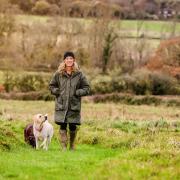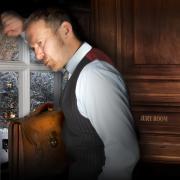Deborah Meaden, the tough-talking female member of BBC2's Dragon's Den, discusses her Brightlingsea childhood and her impatience with business bluffers
A Dragon's tale
DEBORAH MEADEN has forgotten to phone me because she’s been out horse-riding on her Somerset farm. She phones two hours later full of apologies and goes on to prove she’s not at all the harsh harridan she has sometimes been portrayed as. She’s funny, friendly and refreshingly honest and direct – a breath of fresh air, in fact.The only female panellist on BBC2’s Dragon’s Den divides her time between her rural retreat in Somerset and London, from where she currently oversees around 15 investments, several of which result from deals she made on the TV show, including Magic Whiteboard and the recipe and social foodie website MyDish.co.uk.
But Deborah, 51, is no stranger to Essex. Her mother, Sonia, was divorced when Deborah and her sister Gail were little, and worked at Butlin’s in Clacton during the summer. While she was struggling to make a living, she left her daughters in the care of a Brightlingsea fisherman and his family.
‘She found this lovely couple to look after us and give us some stability,’ remembers Deborah. ‘I must have been three or four, and my sister started school in Frinton when she was five. I have wonderful memories of my time in Essex. I still have some lovely photos of myself and my sister on the beach. It was a magical time.’
‘I have wonderful memories of my time in Essex. I still have some lovely photos of myself and my sister on the beach. It was magical’
Today, Deborah maintains many Essex interests and is also keen to give a boost to Vicky Newman, the stylist who has looked after her fine, naturally blonde hair for the past 25 years, and who has just opened her own salon in Shenfield.
‘Vicky won’t give me a style just because it’s in fashion – she knows what suits me. She’s extremely good at what she does and has a great client list. If someone like Vicky moves into your neighbourhood, why wouldn’t you use her?’
Deborah moved away from Essex when she was seven – her mother remarried and the family moved to Wiltshire. Brian, her stepdad, is the only man she recognises as her father. ‘I had no recollection of my real father – I’d completely blanked him from my mind. He turned up when I was 16 and I was extremely underwhelmed, and quite irritated he acted like my father when he’d been absent all my life. I wasn’t interested. He wasn’t part of my life.’As her parents were working hard to establish themselves in the holiday trade, Deborah was sent off to boarding school. She hated it. ‘I was only seven, which is very young. Again, it was to give us stability, but I’m a pretty contrary person. I’m a very independent soul and I found the whole regime and what I considered to be silly rules restrictive.’
She later attended Trowbridge grammar school, but still wasn’t happy. ‘I didn’t like school. I couldn’t wait to get out.’ She took a business course at Brighton Tech primarily, ‘with the intention of having a really good time’. She had known from the age of seven she wanted to run her own business, an ambition she puts down to the influence of her mother’s entrepreneurial spirit. ‘I never, ever wanted to do anything else. It never dawned on me that I would work for anyone,’ Deborah explains.
She had some friends working as fashion designers in Milan, so she went to join them. ‘I’ve always believed there’s only one thing that’s guaranteed in life: if you do nothing, nothing happens. I just had to put myself into a very challenging environment, because I think the harder you have to work, the more opportunities will come your way.’
Deborah was only 19, and spoke no Italian, but founded her first business, importing quality ceramics and glassware from Milan into the UK. Harrods and Harvey Nicks agreed to stock the products, but she later discovered the manufacturers were selling direct to the stores, cutting her out. Rather than take them to court, she decided to cut her losses and get out.After running one of the first Stefanel fashion franchises in Britain, Deborah went on to manage several retail and fashion businesses, including a bingo concession at Butlin’s. ‘I was a very good bingo caller,’ she says proudly. ‘It was a fantastic lesson in business: time is money. You had to call the numbers fast enough to get through the games, but not so fast that you lose your customers. You had to be constantly tuned into their needs, because if customers don’t like you, they walk away. My most important business lessons came from that period.’
Her parents by now had their own holiday park company, which Deborah joined in 1988 having made sure she’d established her own business track record first, so that she could command a decent salary.
She rose from running amusement arcades to becoming managing director of Weststar Holidays, expanding the number of holiday parks from one to five.In 1999, she led a management buy-out of Weststar in a typically unsentimental manner. ‘My parents wanted the highest possible price for it and I wanted to pay the lowest price. It was no different to any other negotiation. I am fiercely independent. I do not want to be beholden to anyone.’
She sold part of her stake in the company in 2005, selling the rest in 2007, just before the credit crunch. ‘I think the timing was immaculate,’ adds Deborah.In 2006, Deborah was approached to take part in Dragon’s Den, but initially turned it down. ‘I’d worked very hard to be where I was and I’m very private. I wasn’t sure I wanted to step into the spotlight. I’d never wanted to be famous.’ But, finally, she was won over by the prospect of a new challenge. ‘I’d never done television before and I didn’t know if I was any good at it. That got my attention.’
She did a screen test with Duncan Bannatyne and Richard Farleigh, and loved it. ‘I thought, “This could be fun”. If at that point they hadn’t offered it to me, I’d have been gutted.’Initially, she was seen, perhaps due to the editing, as harsh and impatient, but more recently her warmer side has come through. She points out that viewers only see a fraction of what goes on in the Den.
‘The shortest pitch has been seven minutes and the longest three and a half hours. So you don’t see all the soft bits and laughter. But I make no apologies for getting irritated with some people. If someone asks me for �250,000 and can’t be bothered to tell me what their turnover is, I’m entitled to get a bit annoyed. I just think they’re wasting an amazing opportunity. And it’s disrespectful to us.’
‘I make no apologies for getting irritated with some people. If someone asks me for a quarter of a million pounds, and can’t be bothered to tell me what their turnover is, I’m entitled to get a bit annoyed’
Under pressureIf a would-be entrepreneur fails to remember the figures because their mind has gone blank under pressure, Deborah will try to help them. ‘But I can’t stand bluffers – people who are just making the answers up.’
Sometimes, she has told a hapless entrepreneur in the starkest terms that they should stop deluding themselves and quit. ‘And I think I’m doing them a great service. I could be as charming as the rest of them. I could be the Dragon who says, “Oh, you’re lovely”. I could do all that. But I think it’s much fairer to tell people if they are completely wasting their time. And actually, it’s at my cost, because people then decide that I’m blunt. It would be easier for me not to be blunt – I could be so much more liked.’
She’s not at all upset by comedian Harry Enfield’s send-up of her as a grumpy battle-axe. ‘It’s flattery. He’s a comic genius and I’m amazed he even knows who I am,’ Deborah adds.Away from the Den, much of Deborah’s life is spent at her 17th century farm in Somerset, later additions of which were designed by William Pitt the Elder as a model farm. While Deborah keeps an eye on her investments, husband Paul manages the farm, looks after the animals and grows the vegetables. He’s also a fantastic cook – Deborah hates cooking.The couple originally met when Paul was working at Weststar as a student. At one point, they split up because Deborah did not want to get married – she went off to Venezuela with her sister. But they reunited and have been blissfully happy ever since. ‘There was a time when we wanted children, but I think both of us now think, actually, we quite like our lives as they are. It’s just not an issue.’
Deborah advises any budding entrepreneur to consider seriously whether their family situation will allow them to devote themselves fully to their business.‘There are phases of your life when it’s not fair to take risks. To give a business its best shot is like having a child. You cater for its needs in the early years and then it toddles off on its own and doesn’t need you to feed it any more. But you’ve got to be in a position to nurture it in the beginning, particularly now when times are tough. But if you decide you are the right person, in the right place, to start a business, then go for it. Don’t let anyone put you off.’
Find out moreTo find out more about Deborah Meaden or Dragon’s Den, visit www.deborahmeaden.com
To contact Vicky Newman, call 01277 221565 or visit www.vickynewmanhairandmakeup.com. Vicky Newman trained at Mayfair’s Molton Brown and went on to work at top London stylists Michael Van Clarke and Michaeljohn before going freelance. Previous clients have included the then wife of the Sultan of Brunei, Sting, Trudie Styler and Amanda de Cadanet. Deborah Meaden has been a client for 25 years and Vicky was instrumental in softening her image on recent series of Dragon’s Den. Vicky’s new salon is on Hutton Road in Shenfield and offers make-up and hair styling in a relaxed, intimate setting.


























